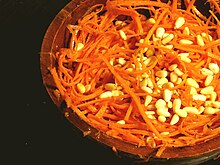This is an old revision of this page, as edited by Candleabracadabra (talk | contribs) at 22:20, 19 July 2013. The present address (URL) is a permanent link to this revision, which may differ significantly from the current revision.
Revision as of 22:20, 19 July 2013 by Candleabracadabra (talk | contribs)(diff) ← Previous revision | Latest revision (diff) | Newer revision → (diff)| This article or section is in a state of significant expansion or restructuring. You are welcome to assist in its construction by editing it as well. If this article or section has not been edited in several days, please remove this template. If you are the editor who added this template and you are actively editing, please be sure to replace this template with {{in use}} during the active editing session. Click on the link for template parameters to use.
This article was last edited by Candleabracadabra (talk | contribs) 11 years ago. (Update timer) |




Carrot salad is a salad made with carrots. Recipes vary widely by regional cuisine. Shredded carrot is often used and raisins are a common ingredient. Shredded carrot salads are often used as a topping for other dishes.
By country
Carrot raisin salad is a traditional dish in the Southern United States (List of foods of the Southern United States). Grated salad is mixed with raisins, mayonnaise, granulated sugar, salt and black pepper.
The Koryo-saram, ethnic Koreans in the post-Soviet Union states, popularized spicy carrot salad, known throughout the Soviet Union as Korean-style carrots (Морковь по-корейски). It is said to have been unknown in South Korea until recently, but has gained an international following and is served in many cafeterias throughout the CIS where it is also sold in supermarkets,and featured regularly as a side dish on dinner tables and at holiday feasts set by many ethnicities of the former Soviet Union.
In India, carrot salads are often made with grated carrots are cooked with mustard seeds and green chillies in hot oil.
In Bulgarian cuisine a salad with carrots and cabbage is traditional.
In Brazilian cuisine, churrasco service often includes potato salad and carrot salad made with mayonnaise, raw onion, green peas, sweetcorn or sometimes chayote squashes.
Houria is cooked carrot salad in Tunisian cuisine.
In Russia, doner kebab often includes carrot salad as an accompaniment to the meat.
Surówka z Marchewki is a Polish cuisine carrot salad made with carrots, granny smith apple, lemon juice, sunflower oil or vegetable oil, salt, and sugar.
Moroccan carrot salad is eaten in Israel.
Macedonia (food) is a dish that was represented in the 1940s and 1950s in north Africa and Québec (Québec City especially) with cans "de la macédoine" of diced carrots and peas.
The zazous subculture of France were said to frequent vegetarian restaurants where grated carrot salad was commonly consumed, as well as fruit juice or beer with grenadine syrup.
References
- "Carrot Salad - Carrot Salad Recipe with Shredded Carrots and Raisins". Southernfood.about.com. Retrieved 2013-07-19.
- Moskin, Julia (2006-01-18), "The Silk Road Leads to Queens", The New York Times, retrieved 2010-01-08
- Andrei Lankov (2012-08-21). "Korean carrot | Russia Beyond The Headlines ASIA". Via.sawd.ch. Retrieved 2013-07-19.